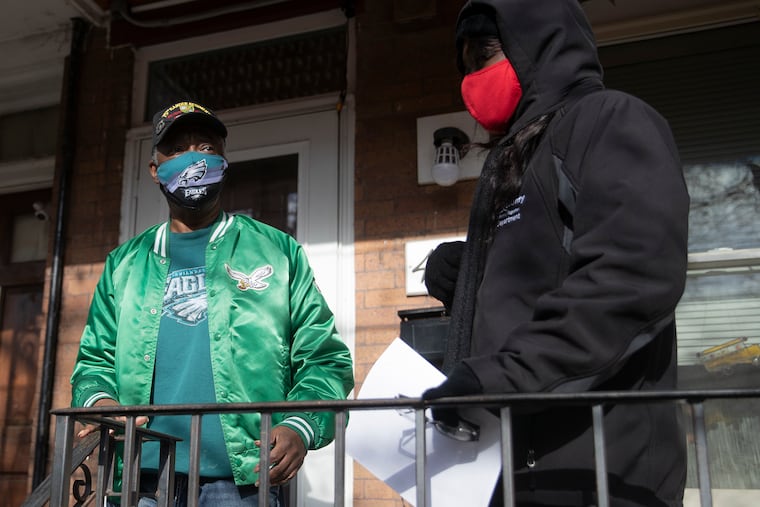In Philly area, COVID-19 cases are rising fastest in Camden. Health workers are going door-to-door to stop the surge.
Camden has surged past 5,000 COVID cases and so Rachel Honrychs, a health education specialist, and others with the Camden Coalition of Healthcare Providers are going door-to-door.

Hearing a knock, Karl Beverly, 72, opened the door of his Viola Street rowhouse in Camden to find seven people looking back at him.
Kyisha Lingo with the Camden County Health Department handed him a flier, and explained the group — consisting of health workers and police officers from a community outreach unit — was going door-to-door informing residents on how to stay safe during the holidays as COVID-19 continues to surge.
Camden last week became the first municipality in the region other than Philadelphia to hit 5,000 cases, with a total of 5,531as of Thursday. What’s more, the city has reported more than 1,000 new cases since Nov. 24. That means more than 7% of Camden residents have been infected with the coronavirus, or one out of every 14 residents.
Beverly said he has been taking precautions since March, and plans to get vaccinated as soon as the shot is available in the U.S. The Vietnam veteran said he sees some people wear masks and others who don’t in his Waterfront South neighborhood, where he’s lived for the past six years.
“I’m at the age where it’s a daily thought,” said Beverly, who wore a mask. “I don’t want to get COVID.”
Paschal Nwako, public health coordinator for Camden County, said the city is likely seeing a post-Thanksgiving spike and expects another after Christmas. He said pandemic fatigue has set in and people want to congregate. That means more cases, and changing patterns of infection.
In the spring, Nwako said it was more typical for an infected person in Camden to remain the only one in their home with COVID-19. Now, the health department is seeing four and five people within the same family test positive. And the most frequent age range of those infected has dropped from 65-70 years to 30-40 years.
The county is sending out teams to canvass hard-hit neighborhoods like Waterfront South to educate residents on safety measures, and also help those who are dealing with food insecurity, job loss, and other issues worsened by the pandemic.
The county is also preparing to distribute the Pfizer vaccine, likely starting next week for Cooper Hospital staff and emergency workers.
Vaccines for residents could start being rolled out in late January or February, Nwako believes. The county is working with the Camden Coalition of Healthcare Providers to survey residents about their vaccination beliefs, a vital step since national surveys indicate that people of color tend to distrust the vaccine. It is training city residents as ambassadors to help educate Hispanic and Black residents — those disproportionately hit by COVID-19 — as well as religious communities on vaccine safety.
On Tuesday, it was in the low 30s when workers from the health department set up a station at the corner of Broadway and Viola Street with about 60 boxes of holiday food, including macaroni and cheese and canned ham, yams, and fruit, along with masks and educational material about the coronavirus.
Meanwhile, about 20 workers fanned out into the neighborhood to knock on doors.
“We really want to see boots on the ground,” said Rachel Honrychs, a public health education specialist with the county. “Our main focus is COVID. But COVID has created a domino effect, making every issue worse than it was before — the housing crisis, food insecurity.”
Cramer Hill, North Camden, and Whitman Park are three neighborhoods experiencing the biggest surges so the county opened three pop-up test sites in those neighborhoods Wednesday.
Honrychs said not only is there misinformation being spread, but residents don’t want to go to the hospital or medical appointments for non-COVID-19 issues for fear of catching the virus.
“They don’t know where to get masks, they don’t know where to get food,” Honrychs said.
As she spoke, several people approached the food station without masks and were given them.
Officer Nathan Heywood was there to offer the health department workers assistance. He said the police department’s six-member community outreach unit, in operation since August, also helps with non-COVID-19 issues.
“We’re trying to build a better relationship with the community,” Heywood said. “We have some families where we will bring toys, food.”
The outreach group knocked on the door of a two-story, red-brick home on Broadway, one of the city’s main thoroughfares. There, Latisa Alford, 48, slid open a second story window to see who was at the door. Alford put on a mask and came down to talk with the workers.
Alford cares for her parents and takes precautions as a result. She is aware of the rise in cases in the city, and no one in her family has contracted the virus so far. Four other family members live at the house.
“I limit my travel,” Alford said. “I only go into work one day a week. It’s all about keeping it safe for my mother.”
Inquirer graphics editor John Duchneskie contributed to this report.